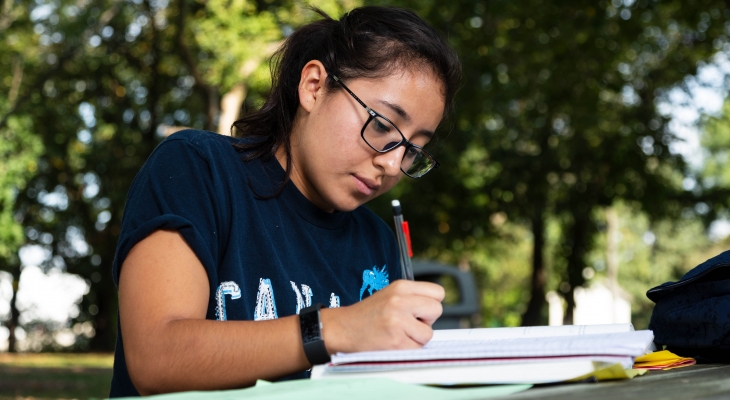
Financial Aid Application Completion Night
In addition to ENG 101 and ENG 102, which are required for most of JJC's associate degree programs, the English, Philosophy and World Languages Department offers a variety of courses in English, Journalism, Literature & Film, Philosophy, and World Languages – many of which satisfy the Humanities General Education requirement.
Language offerings include:
The department also offers courses for students who would benefit from additional help with developing their reading and writing skills. Enrollment in these courses is dependent on placement scores.
Contact the following professors and staff members with any questions about these programs:
World Languages courses
Developmental reading/writing or English for Academic Purposes (EAP) courses
Composition courses (such as ENG 101/102)
Literature courses
Journalism courses
Philosophy courses
English 101 placement
Other courses or information in English, Philosophy and World Languages
The English for Academic Purposes (EAP) program aims to prepare non-native speakers of English with the academic skills and strategies integral to their success in future undergraduate and graduate studies. In addition to providing intensive academic study in reading and writing, the EAP program is designed to broaden cultural knowledge and awareness in the United States.
English for Academic Purposes (EAP) Writing courses introduce students to fundamental English writing skills, including composition, and critical thinking. Emphasis is placed on effective sentence skills, paragraph development, and essay-level skills, as well as rhetorical and mechanical proficiency.
Students enrolling in courses in the EAP writing sequence (ENG 088 and ENG 089) will develop skills in sentence, paragraph, and essay writing. ENG 088 prepares students for multi-paragraph essay writing, and ENG 089 requires students to write academic style essays in preparation for the English composition sequence (ENG 101 and 102).
What Will I Learn?
Students enrolling in any of the English department’s EAP writing courses will learn grammatical accuracy, the steps of the writing process, close reading skills, and presentation of writing to college audiences. In addition, students will begin to develop skills in rhetoric, analysis, organization, grammar and style, voice, tone, and audience awareness. These courses also prepare international and non-native students for the unique demands and requirements of American academic contexts and culture.
What is Unique about Our Program?
Our English for Academic Purposes program specifically addresses the unique linguistic needs of English language learners. The courses are longer and more rigorous than the traditional developmental English classes, and our faculty specialize in working with students with diverse language and cultural backgrounds. Our writing courses help non-native students prepare for success in credit classes.
English for Academic Purposes (EAP) Reading courses introduce students to fundamental college-level skills in English Reading, composition, and critical thinking. Emphasis is placed on effective vocabulary building, text annotation, close reading, summary, and synthesis skills. Students read texts from various genres but focus primarily on academic texts.
Students enrolling in courses in the EAP Reading sequence (ENG 078 and ENG 079) will develop skills in effective reading habits. All four courses cultivate students’ skills in comprehension, reading more quickly, and vocabulary development with texts appropriate to each level. Upon successful completion of these courses and the Writing sequence, students will be eligible to pursue the college’s composition sequence of courses.
What Will I Learn?
Students enrolling in any of the English department’s EAP Reading courses will learn close reading skills, note taking and text annotation skills, and the consumption of a wide variety of college-level texts. In addition, students will begin to develop skills in analysis, summary, synthesis, and active reading. Some writing is required to help students respond to and critique texts using academic prose.
What is Unique about Our Program?
Our English for Academic Purposes program specifically addresses the unique linguistic needs of English language learners. The courses are longer and more rigorous than the traditional developmental English classes, they thoroughly prepare students for success in credit classes, and our faculty specialize in working with students with diverse language and cultural backgrounds.
World languages courses emphasize the development of the four language skills (listening, speaking, reading, and writing) in practical and realistic situations meaningful to beginning students.
Students will develop four communication skills (listening, speaking, reading, and writing) in Spanish or French, in practical and realistic situations. Students taking the 104 level of these courses will also study the history and culture of Spanish or French speaking countries.
These less-commonly taught and critical languages are offered with a tutor under our Self Instructional Language Program (SILP), and they can be taken for 3 credit hours or can be audited for no credit. The SILP method involves a self-study class in which students study, learn, and practice the vocabulary and grammar on their own, and then work with the tutor in weekly small group sessions.
The focus is on an independent approach to develop listening and speaking skills as initial steps to achieving competence in the language. Emphasis is given to intensive drill, practice and review through repetition, classroom activities, and in-class conversations among students and with the tutor.
JJC offers several options for Studying Abroad while earning JJC credits.
Knowledge of a foreign language as a complementary skill is valuable because it can help students communicate with speakers of that language, and it can enrich one’s experience traveling to countries where that language is spoken. Potentially, it could also be an asset with respect to employability.
For example, knowledge of a foreign language can be used in the following fields:
The literature and film courses offered at JJC are all designed to highlight the important role the Humanities play in a general education curriculum.
Students enrolling in literature and film courses will develop skills in critical thinking and analysis, close and active reading, as well as learn to appreciate the diverse voices from authors around the world. Students will also develop critical writing skills as they use writing to present their interpretation and analysis of the works under study.
The English and World Languages department offers an incredibly broad range of courses, many of which satisfy Humanities or Fine Arts requirements for transfer and continuing education credit. In addition, several other courses can be used as transfer electives. The department offers survey courses in American (103 and 104) and British (105 and 106) literature; children’s literature (109); film study (190); introductions to poetry, fiction, and drama (201, 202, 203); world literature (208 and 209); non-Western literature (220); Shakespeare (250); minority American literature (260); and women writers (270). The department also offers a Special Topics course (299) to study specific authors, movements, genres, or other unique interests.
Journalism at JJC offers four basic courses that prepare a student for a major in journalism at a four-year college or university.
Our courses—Introduction to Mass Media, Introduction to Public Relations, Basic News Writing, and Basic News editing—form the foundation of a journalism degree. Anyone interested in journalism (in all of its forms) will benefit by setting a foundation for the degree with these four basic courses.
As a journalism student at JJC, you will first learn about the various media that inform and entertain us, ranging from hard news to film to public relations to the recording industry and advertising. By doing so, you will learn about how the media affects us every day and how it helps to shape the world around us. You will then learn how to write and edit in the journalistic style—both for print and online publications as well as broadcast (TV and radio). You will also learn about the strong connection between Public Relations and the news and entertainment worlds.
Finally, you will learn how to communicate clearly and succinctly, a skill that translates into a variety of fields.
Unlike most community colleges, we offer four courses that are transferable to colleges and universities across Illinois and the country. While most programs offer introduction to mass media and some basic writing and editing courses, we also offer an introduction to Public Relations, a field many consider even after working in the news field for many years.
We also offer an opportunity to work on an award-winning student newspaper that also has a strong online presence. Although the newspaper is not directly tied to the program, many of the editors and writers first learn about journalism in the program.
Journalism covers a broad range of fields, both in traditional journalism and in areas not immediately identified as journalism. As a journalism major, after you complete the four basic courses at JJC, you can choose a concentration at a four-year institution that will prepare you for work in the print, broadcast, public relations, advertising or photography worlds.
Many journalists practice in the news field, but just as many work in public information for colleges, universities and government agencies. Our graduates edit magazines and newspapers; write news, sports and entertainment; work in the broadcast media; serve as public relations and advertising professionals; work in sports information; and work as information specialists in corporate and non-profit settings.
JJC's philosophy courses will introduce students to major topics in philosophy and help students develop critical and analytical thinking skills.
JJC philosophy courses include:
These courses satisfy the Humanities requirement and are transferable to other colleges and universities in Illinois and across the country.
Studying philosophy is both interesting and useful. Not only will students get to explore some of the most enduring and fascinating questions about themselves and their place in the world, they will also learn to understand and evaluate arguments for and against different viewpoints. They will further develop their writing and critical thinking skills.

